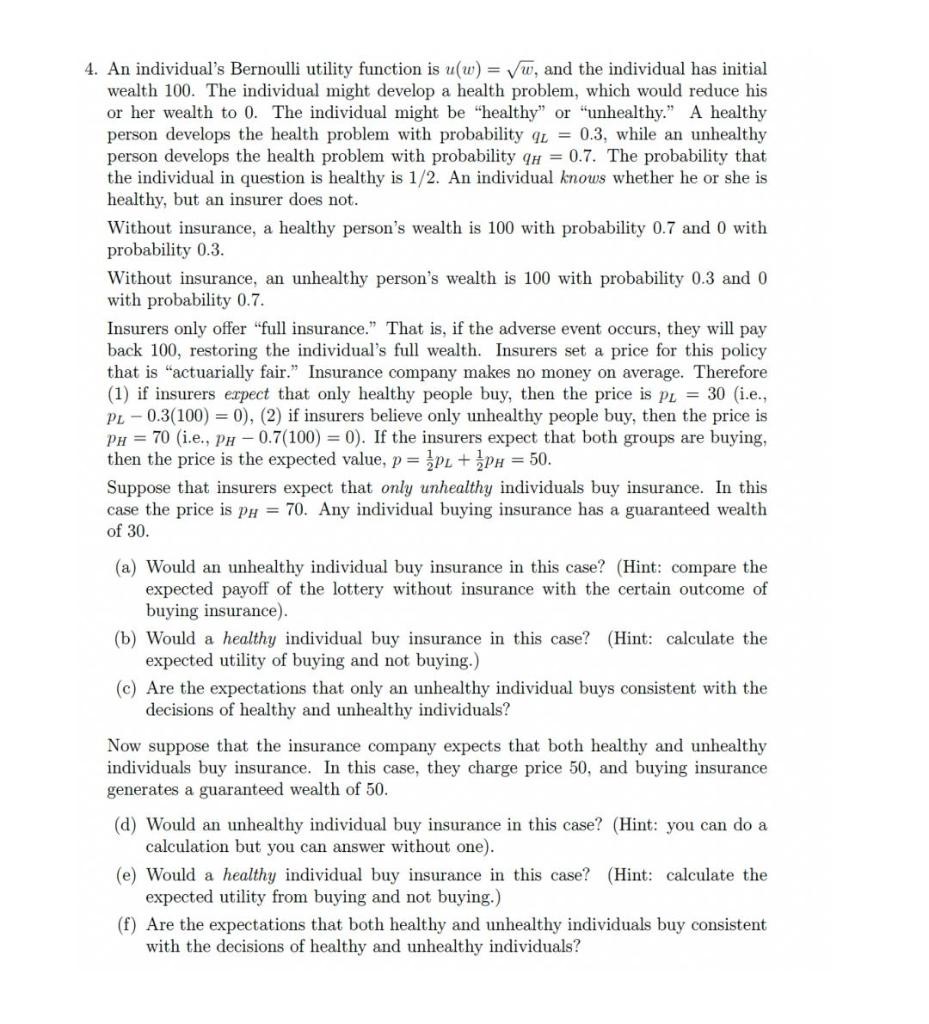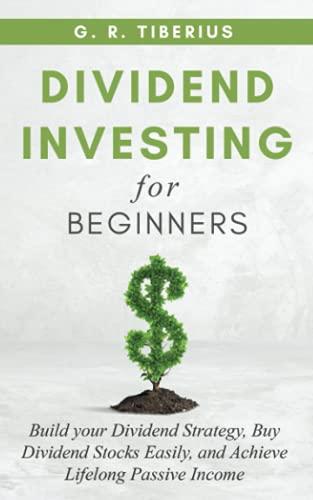
4. An individual's Bernoulli utility function is u(w) = vw, and the individual has initial wealth 100. The individual might develop a health problem, which would reduce his or her wealth to 0. The individual might be "healthy" or "unhealthy." A healthy person develops the health problem with probability 9L = 0.3, while an unhealthy person develops the health problem with probability qu = 0.7. The probability that the individual in question is healthy is 1/2. An individual knows whether he or she is healthy, but an insurer does not. Without insurance, a healthy person's wealth is 100 with probability 0.7 and 0 with probability 0.3 Without insurance, an unhealthy person's wealth is 100 with probability 0.3 and 0 with probability 0.7. Insurers only offer "full insurance." That is, if the adverse event occurs, they will pay back 100, restoring the individual's full wealth. Insurers set a price for this policy that is "actuarially fair." Insurance company makes no money on average. Therefore (1) if insurers expect that only healthy people buy, then the price is pl = 30 (i.e., PL -0.3(100) = 0), (2) if insurers believe only unhealthy people buy, then the price is PH = 70 (i.e., Ph-0.7(100) = 0). If the insurers expect that both groups are buying, then the price is the expected value, p = {PL + kph = 50. Suppose that insurers expect that only unhealthy individuals buy insurance. In this case the price is ph = 70. Any individual buying insurance has a guaranteed wealth of 30. (a) Would an unhealthy individual buy insurance in this case? (Hint: compare the expected payoff of the lottery without insurance with the certain outcome of buying insurance) (b) Would a healthy individual buy insurance in this case? (Hint: calculate the expected utility of buying and not buying.) (c) Are the expectations that only an unhealthy individual buys consistent with the decisions of healthy and unhealthy individuals? Now suppose that the insurance company expects that both healthy and unhealthy individuals buy insurance. In this case, they charge price 50, and buying insurance generates a guaranteed wealth of 50. (d) Would an unhealthy individual buy insurance in this case? (Hint: you can do a calculation but you can answer without one). (e) Would a healthy individual buy insurance in this case? (Hint: calculate the expected utility from buying and not buying.) (f) Are the expectations that both healthy and unhealthy individuals buy consistent with the decisions of healthy and unhealthy individuals? 4. An individual's Bernoulli utility function is u(w) = vw, and the individual has initial wealth 100. The individual might develop a health problem, which would reduce his or her wealth to 0. The individual might be "healthy" or "unhealthy." A healthy person develops the health problem with probability 9L = 0.3, while an unhealthy person develops the health problem with probability qu = 0.7. The probability that the individual in question is healthy is 1/2. An individual knows whether he or she is healthy, but an insurer does not. Without insurance, a healthy person's wealth is 100 with probability 0.7 and 0 with probability 0.3 Without insurance, an unhealthy person's wealth is 100 with probability 0.3 and 0 with probability 0.7. Insurers only offer "full insurance." That is, if the adverse event occurs, they will pay back 100, restoring the individual's full wealth. Insurers set a price for this policy that is "actuarially fair." Insurance company makes no money on average. Therefore (1) if insurers expect that only healthy people buy, then the price is pl = 30 (i.e., PL -0.3(100) = 0), (2) if insurers believe only unhealthy people buy, then the price is PH = 70 (i.e., Ph-0.7(100) = 0). If the insurers expect that both groups are buying, then the price is the expected value, p = {PL + kph = 50. Suppose that insurers expect that only unhealthy individuals buy insurance. In this case the price is ph = 70. Any individual buying insurance has a guaranteed wealth of 30. (a) Would an unhealthy individual buy insurance in this case? (Hint: compare the expected payoff of the lottery without insurance with the certain outcome of buying insurance) (b) Would a healthy individual buy insurance in this case? (Hint: calculate the expected utility of buying and not buying.) (c) Are the expectations that only an unhealthy individual buys consistent with the decisions of healthy and unhealthy individuals? Now suppose that the insurance company expects that both healthy and unhealthy individuals buy insurance. In this case, they charge price 50, and buying insurance generates a guaranteed wealth of 50. (d) Would an unhealthy individual buy insurance in this case? (Hint: you can do a calculation but you can answer without one). (e) Would a healthy individual buy insurance in this case? (Hint: calculate the expected utility from buying and not buying.) (f) Are the expectations that both healthy and unhealthy individuals buy consistent with the decisions of healthy and unhealthy individuals







